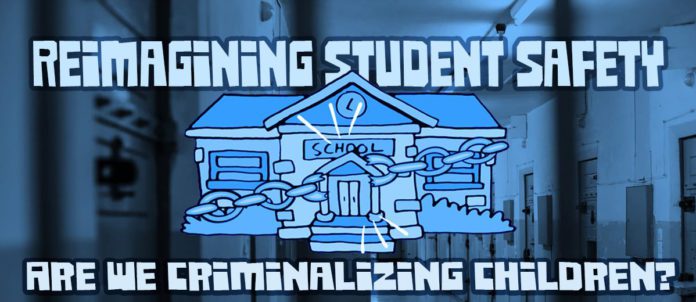by Curtis Weathers —
The debate about the role or presence of law enforcement in our schools is one that needs to be had.
Law Enforcement has a role in our schools; it’s up to educators to clearly define how that role should be carried out.
School districts across the country are moving to end their relationships with law enforcement agencies and some officials in Shelby County Schools are raising concerns about the role of police officers in district schools.
At a recent SCS board work session, members reportedly were at odds over the cost and use of 36 resource officers deployed in schools throughout the district.
Several board members are voicing concerns about the efficiency and value of their services.
School systems around the country are suspending and some are eliminating totally their relationships with law enforcement in their communities.
While it is true that not all schools need police officers or School Resource Officers (SRO) patrolling their campuses, these resources are a layer of school safety that is sometimes needed to maintain order in their respective schools.
Criminal activity takes place in our nation’s schools every day. That is not conjecture, that is fact. And, of course, some schools see significantly more activity than others.
Gun violence in the streets of Memphis and in cities across America is at an all-time high. There is no evidence to suggest this trend will lessen anytime soon. It won’t be long before this epidemic seeps into our schools and threatens the safety of our children and school community as a whole.

Remember, thanks to our political leadership in Nashville, it is now easier than ever for people to purchase and carry firearms in our state.
It’s just a matter of time before this decision by lawmakers shows up on the doorsteps of our schools.
Already, during the first five weeks of the school year, five students from Metro Nashville Public Schools have been arrested and charged with felony possession of a firearm on a public-school campus.
Shelby County Schools has 125 police officers, including 45 Shelby County Department deputies, working in its schools.
In 2019, SCS Superintendent Joris Ray proposed creating its own district police force to replace sheriff’s deputies. He called it the “Peace Force.”
Ray believes that Shelby County Schools would be able to manage and train its officers more effectively if they reported directly to the district.
I concur.
But some school board members disagree, saying they weren’t convinced students would be treated any better.
But the district is on the right track. They seem to be focused on training rather than transfer.
According to district officials, officers in their schools receive enhanced training in recognizing precursors to violence and training in nonviolent crisis prevention and gang interventions.
Moreover, the district also has expanded the use of its ReSet Rooms that are used to help students calm down after emotional or tense encounters with police, teachers or other students.
These efforts have had success in lowering suspension rates and minimizing confrontations in schools.
Eliminating the services of law enforcement in schools should be treated as a needs-based decision.
Police officers or SROs, properly trained, can be a calming influence in a school environment.
In the wake of all the emotions over police reform and racial reckoning, school systems across the country seem to be making decisions based on their emotions and pressure from activists, not rational thinking.
For example, the superintendent in the Portland, Oregon school system reportedly fired all of the police officers working in its nine high schools even though they did not have to pay for their services.
Instead, the Portland school system increased spending on social workers, counselors and culturally specific supports for students.
Keep in mind, there always are situations that can occur on a school campus that can make you wish you had law enforcement personnel at your immediate disposal.
Instead of just removing all of these officers, why not do the hard work of listening to feedback from students, parents and community members, and draft a comprehensive plan to provide a safe environment for students and staff that include more counselors (if necessary), teachers, social workers, AND law enforcement.
Training is the key to blending these resources into a safe campus environment.
There also is a growing body of evidence that suggests school resource officers feed the so-called school-to-prison pipeline.
A recent report from the Brookings Institute found, for example, that school policing tends to criminalize adolescent behavior way too much.
The Frayser Community Schools (FCS), a charter school network here in Memphis, is an excellent example of how school leaders might respond to this kind of data.
FCS significantly has reduced the number of law enforcement officers patrolling its campuses, but, at the same time, are taking a more holistic approach to discipline in their schools.
FCS removed officers from its two middle schools, Humes and Westside Middle Schools, keeping one private officer in its high school, M.L.K. College Preparatory High School.
But more important, they are implementing additional strategies to address discipline in their schools, and have provided their teachers and staff professional development training to help prepare them for the shift away from policing.
I applaud their efforts.
We live in perilous times and we need to make an effort to blend our law enforcement personnel seamlessly into our school environment so our children feel safe because of them, not in spite of them.
It is a mistake (in my humble opinion) to categorically dismiss police or security officers without a comprehensive safety plan for students and staff that fills the void left by these officers upon their departure.
There are multiple examples around the country and in Memphis of police officers and schools working together to successfully create a safe environment for their students.
Let’s learn from their experiences.
Stay safe, everyone!
(Follow TSD education columnist Curtis Weathers on Twitter (@curtisweathers); email: curtislweathers@gmail.com.)



